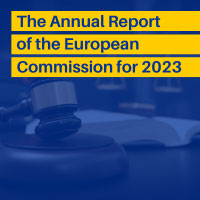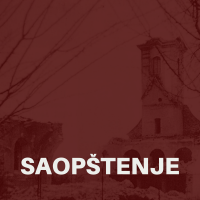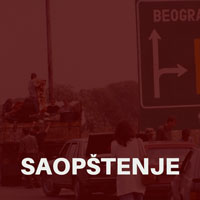
 The Appeals Chamber of the International Residual Mechanism for Criminal Tribunals (IRMCT) passed a judgment on the case against two former leaders of the State Security Service (SDB) of the Republic of Serbia’s Ministry of the Interior – Jovica Stanišić and Franko Simatović – establishing an international armed conflict in Bosnia and Herzegovina. This judgment has finally and unequivocally established the participation of the Republic of Serbia in the armed conflicts in Bosnia and Herzegovina and Croatia. The highest officials of the RS SDB were convicted as members of the joint criminal enterprise for the crimes perpetrated by the Serbian Volunteers’ Guard (SDG), Special Action Unit, Special Operations Unit (JSO) – the Red Berets, Martić’s Police and Scorpions in 1992 in Bosnia and Herzegovina: Bijeljina, Zvornik, Bosanski Šamac, Doboj and Sanski Most, and for the crimes perpetrated in 1995 in Trnovo and Sanski Most, as well as for the murder of Marija Senaši, perpetrated in Dalj Planina, Croatia, in June 1992.
The Appeals Chamber of the International Residual Mechanism for Criminal Tribunals (IRMCT) passed a judgment on the case against two former leaders of the State Security Service (SDB) of the Republic of Serbia’s Ministry of the Interior – Jovica Stanišić and Franko Simatović – establishing an international armed conflict in Bosnia and Herzegovina. This judgment has finally and unequivocally established the participation of the Republic of Serbia in the armed conflicts in Bosnia and Herzegovina and Croatia. The highest officials of the RS SDB were convicted as members of the joint criminal enterprise for the crimes perpetrated by the Serbian Volunteers’ Guard (SDG), Special Action Unit, Special Operations Unit (JSO) – the Red Berets, Martić’s Police and Scorpions in 1992 in Bosnia and Herzegovina: Bijeljina, Zvornik, Bosanski Šamac, Doboj and Sanski Most, and for the crimes perpetrated in 1995 in Trnovo and Sanski Most, as well as for the murder of Marija Senaši, perpetrated in Dalj Planina, Croatia, in June 1992.
The Appeals Chamber has established that Stanišić and Simatović, together with other military, political and police leadership from Serbia, the so-called SAO Krajina, SAO Slavonija, Baranja and Western Srem, as well as from the Republic of Srpska, constituted part of the joint criminal enterprise aimed at permanent expulsion of non-Serb population from the territories under the control of the Serb forces in BiH and Croatia, i.e. – ethnic cleansing.

 On November 8th, 2023, the European Commission (EC) adopted an annual report assessing the situation and progress of the Republic of Serbia on its path to accession to the European Union.
On November 8th, 2023, the European Commission (EC) adopted an annual report assessing the situation and progress of the Republic of Serbia on its path to accession to the European Union.






 On the occasion of the 32nd anniversary of the crime at the farm at Ovčara near Vukovar, the Humanitarian Law Center (HLC) requests the institutions of Serbia to prosecute the officers of the former JNA who directly contributed to the commission of that crime, to give up supporting war criminals, to bring to a satisfactory conclusion the years-long search for the mortal remains of victims, and to help enable the creation of a memory culture dignifying victims.
On the occasion of the 32nd anniversary of the crime at the farm at Ovčara near Vukovar, the Humanitarian Law Center (HLC) requests the institutions of Serbia to prosecute the officers of the former JNA who directly contributed to the commission of that crime, to give up supporting war criminals, to bring to a satisfactory conclusion the years-long search for the mortal remains of victims, and to help enable the creation of a memory culture dignifying victims.




 For 28 years, the institutions of the Republic of Serbia have covered up, denied, and minimized the genocide in Srebrenica. They support, protect, and celebrate those who committed the genocide, while concealing and avoiding the responsibility of state authorities for supporting its execution. Those accused of participating in the Srebrenica genocide are finding refuge in Serbia, while the convicted individuals actively participate in public and political life, free to distort facts and minimize the scale of the genocide. Judicial authorities, including the Office of War Crimes Prosecutor, directly and indirectly delay and obstruct the establishment of facts about the genocide in Srebrenica before domestic courts. The qualification of the Srebrenica crime as genocide is not applied, the number of victims is reduced, and the few convicted perpetrators receive unduly mild sentences. Any connection between Serbian state authorities and the execution of the genocide is carefully concealed in proceedings before domestic courts.
For 28 years, the institutions of the Republic of Serbia have covered up, denied, and minimized the genocide in Srebrenica. They support, protect, and celebrate those who committed the genocide, while concealing and avoiding the responsibility of state authorities for supporting its execution. Those accused of participating in the Srebrenica genocide are finding refuge in Serbia, while the convicted individuals actively participate in public and political life, free to distort facts and minimize the scale of the genocide. Judicial authorities, including the Office of War Crimes Prosecutor, directly and indirectly delay and obstruct the establishment of facts about the genocide in Srebrenica before domestic courts. The qualification of the Srebrenica crime as genocide is not applied, the number of victims is reduced, and the few convicted perpetrators receive unduly mild sentences. Any connection between Serbian state authorities and the execution of the genocide is carefully concealed in proceedings before domestic courts. Humanitarian Law Center (HLC) flags the suspicious intentions of the Republic of Serbia’s judicial authorities, evinced by substituting a member of trial chamber in the case of
Humanitarian Law Center (HLC) flags the suspicious intentions of the Republic of Serbia’s judicial authorities, evinced by substituting a member of trial chamber in the case of 
 The Appeals Chamber of the International Residual Mechanism for Criminal Tribunals (IRMCT) passed a judgment on the case against two former leaders of the State Security Service (SDB) of the Republic of Serbia’s Ministry of the Interior – Jovica Stanišić and Franko Simatović – establishing an international armed conflict in Bosnia and Herzegovina. This judgment has finally and unequivocally established the participation of the Republic of Serbia in the armed conflicts in Bosnia and Herzegovina and Croatia. The highest officials of the RS SDB were convicted as members of the joint criminal enterprise for the crimes perpetrated by the Serbian Volunteers’ Guard (SDG), Special Action Unit, Special Operations Unit (JSO) – the Red Berets, Martić’s Police and Scorpions in 1992 in Bosnia and Herzegovina: Bijeljina, Zvornik, Bosanski Šamac, Doboj and Sanski Most, and for the crimes perpetrated in 1995 in Trnovo and Sanski Most, as well as for the murder of Marija Senaši, perpetrated in Dalj Planina, Croatia, in June 1992.
The Appeals Chamber of the International Residual Mechanism for Criminal Tribunals (IRMCT) passed a judgment on the case against two former leaders of the State Security Service (SDB) of the Republic of Serbia’s Ministry of the Interior – Jovica Stanišić and Franko Simatović – establishing an international armed conflict in Bosnia and Herzegovina. This judgment has finally and unequivocally established the participation of the Republic of Serbia in the armed conflicts in Bosnia and Herzegovina and Croatia. The highest officials of the RS SDB were convicted as members of the joint criminal enterprise for the crimes perpetrated by the Serbian Volunteers’ Guard (SDG), Special Action Unit, Special Operations Unit (JSO) – the Red Berets, Martić’s Police and Scorpions in 1992 in Bosnia and Herzegovina: Bijeljina, Zvornik, Bosanski Šamac, Doboj and Sanski Most, and for the crimes perpetrated in 1995 in Trnovo and Sanski Most, as well as for the murder of Marija Senaši, perpetrated in Dalj Planina, Croatia, in June 1992.